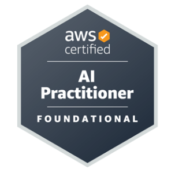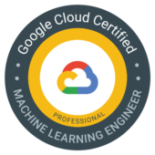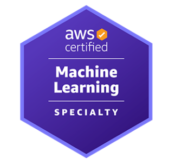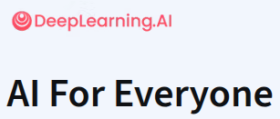Best AI Certifications to Boost Your Career in 2026
Artificial intelligence is creating more opportunities than ever, with new roles appearing across every industry. But breaking into these positions can be difficult when most employers want candidates with proven experience.
Here's what many people don't realize: getting certified provides a clear path forward, even if you're starting from scratch.
AI-related job postings on LinkedIn grew 17% over the last two years. Companies are scrambling to hire people who understand these technologies. Even if you're not building models yourself, understanding AI makes you more valuable in your current role.
The AI Certification Challenge
The challenge is figuring out which AI certification is best for your goals.
Some certifications focus on business strategy while others dive deep into building machine learning models. Many fall somewhere in between. The best AI certifications depend entirely on where you're starting and where you want to go.
This guide breaks down 12 certifications and learning paths that can genuinely advance your career. We'll cover costs, time commitments, and what you'll actually learn. More importantly, we'll help you figure out which one fits your situation.
In this guide, we'll cover:
- Career Switcher Certifications
- Developer Certifications
- Machine Learning Engineering Certifications
- Generative AI Certifications
- Non-Technical Professional Certifications
- Certification Comparison Table
- How to Choose the Right Certification
Let's find the right certification for you.
How to Choose the Right AI Certification
Before diving into specific certifications, let's talk about what actually matters when choosing one.
Match Your Current Experience Level
Be honest about where you're starting. Some certifications assume you already know programming, while others start from zero.
If you've never coded before, jumping straight into an advanced machine learning certification will frustrate you. Start with beginner-friendly options that teach foundations first.
If you're already working as a developer or data analyst, you can skip the basics and go for intermediate or advanced certifications.
Consider Your Career Goals
Different certifications lead to different opportunities.
- Want to switch careers into artificial intelligence? Look for comprehensive programs that teach both theory and practical skills.
- Already in tech and want to add AI skills? Shorter, focused certifications work better.
- Leading AI projects but not building models yourself? Business-focused certifications make more sense than technical ones.
Think About Time and Money
Certifications range from free to over \$800, and time commitments vary from 10 hours to several months.
Be realistic about what makes sense for you. A certification that takes 200 hours might be perfect for your career, but if you can only study 5 hours per week, that's 40 weeks of commitment. Can you sustain that?
Sometimes a shorter certification that you'll actually finish beats a comprehensive one you'll abandon halfway through.
Verify Industry Recognition
Not all certifications carry the same weight with employers.
Certifications from established organizations like AWS, Google Cloud, Microsoft, and IBM typically get recognized. So do programs from respected institutions and instructors like Andrew Ng's DeepLearning.AI courses.
Check job postings in your target field, and take note of which certifications employers actually mention.
Best AI Certifications for Career Switchers
Starting from scratch? These certifications help you build foundations without requiring prior experience.
1. Generative AI Fundamentals in Python

The Generative AI Fundamentals in Python skill path takes a different approach than traditional certifications. Instead of studying for an exam, you learn by building real projects from day one.
- Cost: \$49 per month (or \$29/month annually)
- Time: 20 to 30 hours total
-
What you'll learn: Prompt engineering fundamentals, working with OpenAI and Anthropic APIs, building chatbots and content generators, retrieval-augmented generation (RAG), and deploying generative AI applications.
This is a hands-on learning path, not a certification exam. You write Python code from the start and build a portfolio of working projects as you progress. Each lesson includes interactive coding exercises where you solve real problems.
- Best for: People who learn by doing and want practical skills they can use immediately. Perfect if you're switching careers and need projects to show employers what you can build.
- Why it works differently: Traditional certifications test knowledge, but this builds skills through repetition and practice. You end up with working code samples and projects you can show in interviews. The tradeoff is that it doesn't carry the external recognition of a vendor certification like AWS or Google Cloud.
- Worth knowing: This is a subscription-based learning platform, so you pay monthly while you're learning. The path includes a completion certificate, but it's not a proctored exam. Think of it as building your foundation before tackling vendor certifications, or as an alternative if you prefer demonstrating skills through portfolio projects.
2. Google AI Essentials

This is the fastest way to understand AI basics. Google AI Essentials teaches you what artificial intelligence can actually do and how to use it productively in your work.
- Cost: \$49 per month on Coursera (7-day free trial)
- Time: Under 10 hours total
-
What you'll learn: How generative AI works, writing effective prompts, using AI tools responsibly, and spotting opportunities to apply AI in your work.
The course is completely non-technical, so no coding is required. You'll practice with tools like Gemini and learn through real-world scenarios.
- Best for: Anyone curious about AI who wants to understand it quickly. Perfect if you're in marketing, HR, operations, or any non-technical role.
- Why it works: Google designed this for busy professionals, so you can finish in a weekend if you're motivated. The certificate from Google adds credibility to your resume.
3. Microsoft Certified: Azure AI Fundamentals (AI-900)

Want something with more technical depth but still beginner-friendly? The Azure AI Fundamentals certification gives you a solid overview of AI and machine learning concepts.
- Cost: \$99 (exam fee)
- Time: 30 to 40 hours of preparation
-
What you'll learn: Core AI concepts, machine learning fundamentals, computer vision, natural language processing, and how Azure's AI services work.
This certification requires passing an exam. Microsoft offers free training materials through their Learn platform, and you can also find prep courses on Coursera and other platforms.
- Best for: People who want a recognized certification that proves they understand AI concepts. Good for career switchers who want credibility fast.
- Worth knowing: Unlike most foundational certifications, this one expires after one year. Microsoft offers a free renewal exam to keep it current.
- If you're building foundational skills in data science and machine learning, Dataquest's Data Scientist career path can help you prepare. You'll learn the programming and statistics that make certifications like this easier to tackle.
4. IBM AI Engineering Professional Certificate

Ready for something more comprehensive? The IBM AI Engineering Professional Certificate teaches you to actually build AI systems from scratch.
- Cost: About \$49 per month on Coursera (roughly \$196 to \$294 for 4 to 6 months)
- Time: 4 to 6 months at a moderate pace
-
What you'll learn: Machine learning techniques, deep learning with frameworks like TensorFlow and PyTorch, computer vision, natural language processing, and how to deploy AI models.
This program includes hands-on projects, so you'll build real systems instead of just watching videos. By the end, you'll have a portfolio showing you can create AI applications.
- Best for: Career switchers who want to become AI engineers or machine learning engineers. Also good for software developers adding AI skills.
- Recently updated: IBM refreshed this program in March 2025 with new generative AI content, so you're learning current, relevant skills.
Best AI Certification for Developers
5. AWS Certified AI Practitioner (AIF-C01)

Already know your way around code? The AWS Certified AI Practitioner helps developers understand AI services and when to use them.
- Cost: \$100 (exam fee)
- Time: 40 to 60 hours of preparation
-
What you'll learn: AI and machine learning fundamentals, generative AI concepts, AWS AI services like Bedrock and SageMaker, and how to choose the right tools for different problems.
This is AWS's newest AI certification, launched in August 2024. It focuses on practical knowledge, so you're learning to use AI services rather than building them from scratch.
- Best for: Software developers, cloud engineers, and technical professionals who work with AWS. Also valuable for product managers and technical consultants.
- Why developers like it: It bridges business and technical knowledge. You'll understand enough to have intelligent conversations with data scientists while knowing how to implement solutions.
Best AI Certifications for Machine Learning Engineers
Want to build, train, and deploy machine learning models? These certifications teach you the skills companies actually need.
6. Machine Learning Specialization (DeepLearning.AI + Stanford)

Andrew Ng's Machine Learning Specialization is the gold standard for learning ML fundamentals. Over 4.8 million people have taken his courses.
- Cost: About \$49 per month on Coursera (roughly \$147 for 3 months)
- Time: 3 months at 5 hours per week
-
What you'll learn: Supervised learning (regression and classification), neural networks, decision trees, recommender systems, and best practices for machine learning projects.
Ng teaches with visual intuition first, then shows you the code, then explains the math. This approach helps concepts stick better than traditional courses.
- Best for: Anyone wanting to understand machine learning deeply. Perfect whether you're a complete beginner or have some experience but want to fill gaps.
-
Why it's special: Ng explains complex ideas simply and shows you how professionals actually approach ML problems. You'll learn patterns you'll use throughout your career.
If you want to practice these concepts hands-on, Dataquest's Machine Learning path lets you work with real datasets and build projects as you learn. It's a practical complement to theoretical courses.
7. Deep Learning Specialization (DeepLearning.AI)

After mastering ML basics, the Deep Learning Specialization teaches you to build neural networks that power modern AI.
- Cost: About \$49 per month on Coursera (roughly \$245 for 5 months)
- Time: 5 months with five separate courses
-
What you'll learn: Neural networks and deep learning fundamentals, convolutional neural networks for images, sequence models for text and time series, and strategies to improve model performance.
This specialization includes hands-on programming assignments where you'll implement algorithms from scratch before using frameworks. This deeper understanding helps when things go wrong in real projects.
- Best for: People who want to work on cutting-edge AI applications. Necessary for computer vision, natural language processing, and speech recognition roles.
- Real-world value: Many employers specifically look for deep learning skills, and this specialization appears on countless job descriptions for ML engineer positions.
8. Google Cloud Professional Machine Learning Engineer

The Google Cloud Professional ML Engineer certification proves you can build production ML systems at scale.
- Cost: \$200 (exam fee)
- Time: 100 to 150 hours of preparation recommended
- Prerequisites: Google recommends 3 plus years of industry experience including at least 1 year with Google Cloud.
-
What you'll learn: Designing machine learning solutions on Google Cloud, data engineering with BigQuery and Dataflow, training and tuning models with Vertex AI, and deploying production ML systems.
This is an advanced certification where the exam tests your ability to solve real problems using Google Cloud's tools. You need hands-on experience to pass.
- Best for: ML engineers, data scientists, and AI specialists who work with Google Cloud Platform. Particularly valuable if your company uses GCP.
- Career impact: This certification demonstrates you can handle enterprise-scale machine learning projects. It often leads to senior positions and consulting opportunities.
9. AWS Certified Machine Learning Specialty (MLS-C01)

Want to prove you're an expert with AWS's ML tools? The AWS Machine Learning Specialty certification is one of the most respected credentials in the field.
- Cost: \$300 (exam fee)
- Time: 150 to 200 hours of preparation
- Prerequisites: AWS recommends at least 2 years of hands-on experience with machine learning workloads on AWS.
-
What you'll learn: Data engineering for ML, exploratory data analysis, modeling techniques, and implementing machine learning solutions with SageMaker and other AWS services.
The exam covers four domains: data engineering accounts for 20%, exploratory data analysis is 24%, modeling gets 36%, and ML implementation and operations make up the remaining 20%.
- Best for: Experienced ML practitioners who work with AWS. This proves you know how to architect, build, and deploy ML systems at scale.
- Worth knowing: This is one of the hardest AWS certifications, and people often fail on their first attempt. But passing it carries significant weight with employers.
Best AI Certification for Generative AI
10. IBM Generative AI Engineering Professional Certificate

Generative AI is exploding right now. The IBM Generative AI Engineering Professional Certificate teaches you to build applications with large language models.
- Cost: About \$49 per month on Coursera (roughly \$294 for 6 months)
- Time: 6 months
-
What you'll learn: Prompt engineering, working with LLMs like GPT and LLaMA, building NLP applications, using frameworks like LangChain and RAG, and deploying generative AI solutions.
This program is brand new as of 2025 and covers the latest techniques for working with foundation models. You'll learn how to fine-tune models and build AI agents.
- Best for: Developers, data scientists, and machine learning engineers who want to specialize in generative AI. Also good for anyone wanting to enter this high-growth area.
- Market context: The generative AI market is expected to grow 46% annually through 2030, and companies are hiring rapidly for these skills.
Best AI Certifications for Non-Technical Professionals
Not everyone needs to build AI systems, but understanding artificial intelligence helps you make better decisions and lead more effectively.
11. AI for Everyone (DeepLearning.AI)

Andrew Ng created AI for Everyone specifically for business professionals, managers, and anyone in a non-technical role.
- Cost: Free to audit, \$49 for a certificate
- Time: 6 to 10 hours
-
What you'll learn: What AI can and cannot do, how to spot opportunities for artificial intelligence in your organization, working effectively with AI teams, and building an AI strategy.
No math and no coding required, just clear explanations of how AI works and how it affects business.
- Best for: Executives, managers, product managers, marketers, and anyone who works with AI teams but doesn't build AI themselves.
- Why it matters: Understanding AI helps you ask better questions, make smarter decisions, and communicate effectively with technical teams.
12. PMI Certified Professional in Managing AI (PMI-CPMAI)

Leading AI projects requires different skills than traditional IT projects. The PMI-CPMAI certification teaches you how to manage them successfully.
- Cost: \$500 to \$800 plus (exam and prep course bundled)
- Time: About 30 hours for core curriculum
-
What you'll learn: AI project methodology across six phases, data preparation and management, model development and testing, governance and ethics, and operationalizing AI responsibly.
PMI officially launched this certification in 2025 after acquiring Cognilytica. It's the first major project management certification specifically for artificial intelligence.
- Best for: Project managers, program managers, product owners, scrum masters, and anyone leading AI initiatives.
- Special benefits: The prep course earns you 21 PDUs toward other PMI certifications. That covers over a third of what you need for PMP renewal.
- Worth knowing: Unlike most certifications, this one currently doesn't expire. No renewal fees or continuing education required.
AI Certification Comparison Table
| Certification | Cost | Time | Level | Best For |
|---|---|---|---|---|
| Generative AI Fundamentals in Python | \$49/month | 20-30 hours | Beginner | Hands-on learners, career switchers |
| Google AI Essentials | \$49/month | Under 10 hours | Beginner | All roles, quick AI overview |
| Azure AI Fundamentals (AI-900) | \$99 | 30-40 hours | Beginner | Career switchers, IT professionals |
| IBM AI Engineering | \$196-294 | 4-6 months | Intermediate | Aspiring ML engineers |
| AWS AI Practitioner (AIF-C01) | \$100 | 40-60 hours | Foundational | Developers, cloud engineers |
| Machine Learning Specialization | \$147 | 3 months | Beginner-Intermediate | Anyone learning ML fundamentals |
| Deep Learning Specialization | \$245 | 5 months | Intermediate | ML engineers, data scientists |
| Google Cloud Professional ML Engineer | \$200 | 100-150 hours | Advanced | Experienced ML engineers on GCP |
| AWS ML Specialty (MLS-C01) | \$300 | 150-200 hours | Advanced | Experienced ML practitioners on AWS |
| IBM Generative AI Engineering | \$294 | 6 months | Intermediate | Gen AI specialists, developers |
| AI for Everyone | Free-\$49 | 6-10 hours | Beginner | Business professionals, managers |
| PMI-CPMAI | \$500-800+ | 30+ hours | Intermediate | Project managers, AI leaders |
When You Don't Need a Certification
Let's be honest about this. Certifications aren't always necessary.
If you already have strong experience building AI systems, a portfolio of real projects might matter more than certificates. Many employers care more about what you can do than what credentials you hold.
Certifications work best when you're:
- Breaking into a new field and need credibility
- Filling specific knowledge gaps
- Working at companies that value formal credentials
- Trying to stand out in a competitive job market
They work less well when you're:
- Already established in AI with years of experience
- At a company that promotes based on projects, not credentials
- Learning just for personal interest
Consider your situation carefully. Sometimes spending 100 hours building a portfolio project helps your career more than studying for an exam.
What Happens After Getting Certified
You passed the exam. Great! But, now what?
Update Your Professional Profiles
Add your certification to LinkedIn and your resume. If it comes with a digital badge, show that too.
But don't just list it. Mention specific skills you gained that relate to jobs you want. This helps employers understand why it matters.
Build on What You Learned
A certification gives you the basics, but you grow the most when you use those skills in real situations. Try building a small project that uses what you learned.
You can also join an open-source project or write about your experience. Showing both a certification and real work makes you stand out to employers.
Consider Your Next Step
Many professionals stack certifications strategically. For example:
- Start with Generative AI Fundamentals or Azure AI Fundamentals, then add the Machine Learning Specialization
- Complete Machine Learning Specialization, then Deep Learning Specialization, then an AWS or Google Cloud certification
- Get IBM AI Engineering, then specialize with IBM Generative AI Engineering
Each certification builds on previous knowledge. Building skills in the right order helps you learn faster and avoid gaps in your knowledge.
Maintain Your Certification
Some certifications expire while others require continuing education.
Check renewal requirements before your certification expires. Most providers offer renewal paths that are easier than taking the original exam.
Making Your Decision
You've seen 12 different certifications and learning paths, and each serves different goals.
Here's how to choose:
- If you're completely new to AI: Start with Generative AI Fundamentals in Python, Google AI Essentials, or AI for Everyone. Get the big picture first.
- If you want to switch careers into AI: Azure AI Fundamentals or IBM AI Engineering give you comprehensive foundations.
- If you're a developer adding AI skills: AWS AI Practitioner helps you understand when and how to use AI services.
- If you want to build machine learning models: Start with the Machine Learning Specialization, then move to the Deep Learning Specialization. Consider adding a cloud certification from AWS, Google, or Azure based on what your company uses.
- If you're managing AI projects: PMI-CPMAI teaches you the unique aspects of leading these initiatives.
- If you're focused on generative AI: Generative AI Fundamentals in Python or IBM Generative AI Engineering both cover the latest techniques.
The best AI certification is the one you'll actually complete. Choose based on your current skills, available time, and career goals.
Artificial intelligence skills are becoming more valuable every year, and that trend isn't slowing down. But credentials alone won't get you hired. You need to develop these skills through hands-on practice and real application. Choosing the right certification and committing to it is a solid first step. Pick one that matches your goals and start building your expertise today.